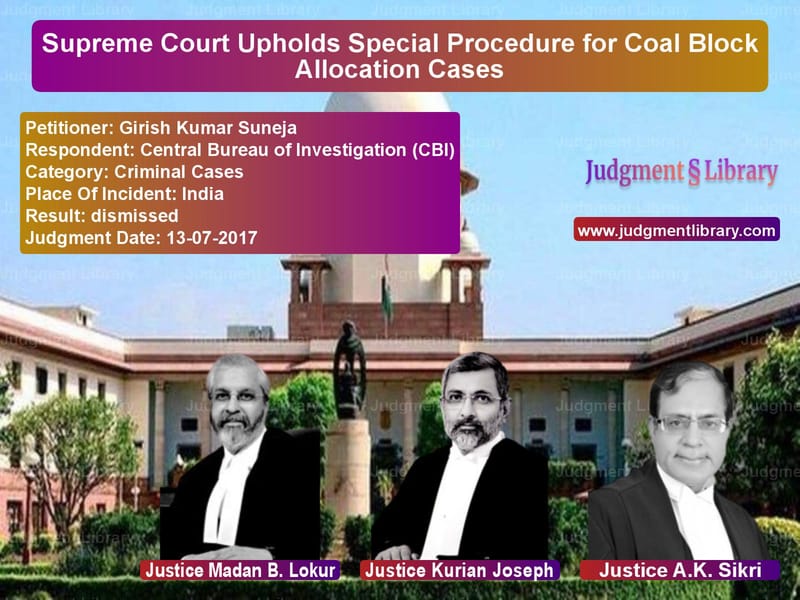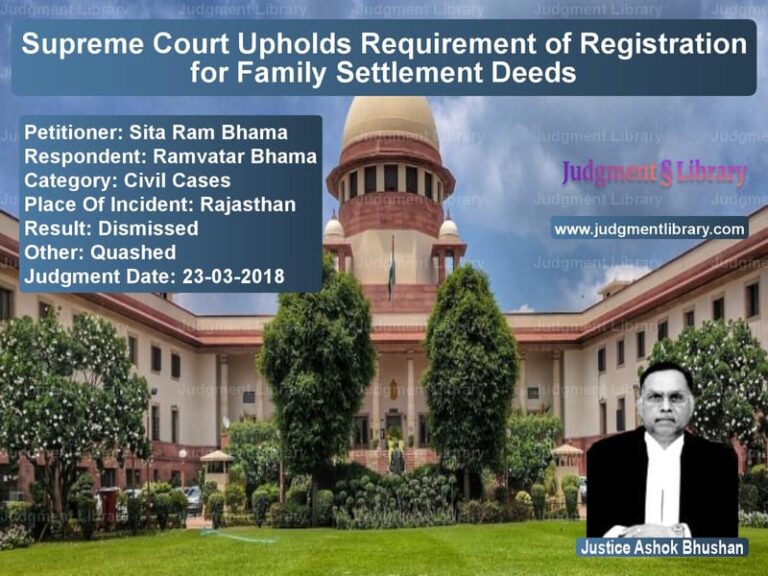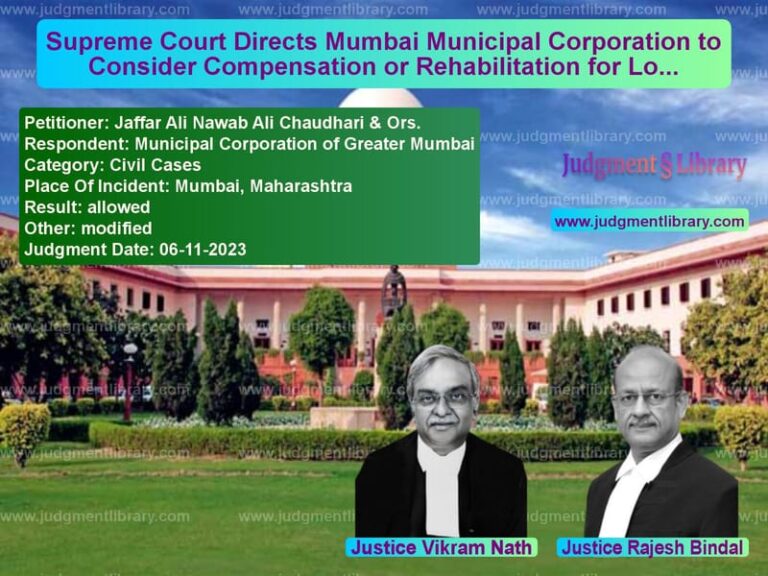Supreme Court Upholds Special Procedure for Coal Block Allocation Cases
The case of Girish Kumar Suneja vs. CBI revolves around the interpretation of an earlier Supreme Court order restricting lower courts from granting stays in the ongoing coal block allocation trials. The Supreme Court upheld the legality of this restriction, emphasizing that such cases involved large-scale corruption and required special treatment.
Background of the Case
The coal block allocation cases stemmed from a 2014 Supreme Court decision, Manohar Lal Sharma v. Principal Secretary, which held that several coal block allocations were conducted in an illegal and arbitrary manner. The Central Bureau of Investigation (CBI) was tasked with investigating the cases, and a special judge was appointed to conduct trials. The Supreme Court, through an order dated July 25, 2014, directed that:
- All cases related to coal block allocations be transferred to a special judge.
- A special public prosecutor be appointed to handle these cases.
- No court other than the Supreme Court could stay the proceedings or impede investigations.
Several accused individuals, including Girish Kumar Suneja, challenged this restriction, arguing that it violated their constitutional rights by preventing them from seeking relief from the High Court.
Arguments by the Appellants
The appellants raised several key arguments against the Supreme Court’s order:
- They had a statutory right to seek revision under Section 397 of the Code of Criminal Procedure, 1973 (CrPC), which allows High Courts to examine the legality of lower court orders.
- They were deprived of their constitutional rights under Articles 226 and 227, which allow for judicial review by High Courts.
- The Supreme Court’s order violated Article 14 of the Constitution by treating coal block cases differently from other criminal cases.
- Their right to life and liberty under Article 21 was violated by preventing them from seeking relief from the High Court.
- Article 142, which grants the Supreme Court special powers to ensure “complete justice,” could not be used to restrict fundamental rights.
Arguments by the Respondents (CBI)
The CBI defended the restriction on stays in coal block cases by arguing:
- The special procedure was necessary due to the large-scale corruption and impact on public interest.
- Allowing High Courts to stay proceedings would delay trials indefinitely.
- Accused individuals still had a remedy—they could approach the Supreme Court if they sought relief.
- The Supreme Court had previously taken a similar approach in the 2G Spectrum scam case, restricting lower courts from staying proceedings.
Supreme Court’s Analysis and Judgment
The Supreme Court, in a detailed judgment authored by Justices Madan B. Lokur, Kurian Joseph, and A.K. Sikri, upheld its previous order and rejected the appellants’ arguments.
1. No Fundamental Right to Revision
The Court ruled that the right to file a revision petition under Section 397 of the CrPC was discretionary and not a fundamental right. While the High Court could exercise its revisionary powers, the accused had no absolute right to demand it.
2. Article 226 and 227 Not an Absolute Right
The Supreme Court held that although High Courts have wide powers under Articles 226 and 227, these powers must be exercised sparingly. The Court cited Kartar Singh v. State of Punjab, which limited the High Court’s power in cases involving national security and large-scale economic crimes.
3. No Violation of Article 14
The Court rejected the argument that treating coal block cases differently violated the right to equality. It ruled that cases involving widespread corruption could be treated as a separate class and handled differently, as was done in the 2G Spectrum case.
4. Article 21 Not Violated
The Court found that the accused had access to justice because they could still approach the Supreme Court. The restriction on High Court intervention was justified to prevent unnecessary delays in trials.
5. Article 142 Used to Ensure Justice
The Supreme Court clarified that its powers under Article 142 were not used to curtail fundamental rights but to ensure speedy trials in cases of national importance.
Final Orders
The Supreme Court ruled:
- The High Court could not stay proceedings or interfere in any coal block allocation cases.
- The accused could challenge lower court orders only in the Supreme Court.
- The Special Judge should continue trials without interruption.
Legal Implications
The ruling set several important legal precedents:
1. Expedited Trials for Large-Scale Corruption Cases
The judgment reaffirmed the Supreme Court’s power to fast-track corruption cases by restricting procedural delays.
2. High Courts’ Limited Role in Special Cases
The decision restricted High Courts from intervening in cases classified as being of “national importance.”
3. Strengthening Public Interest Litigation
The ruling reinforced the need for judicial intervention to address large-scale corruption while balancing the rights of the accused.
Conclusion
The Supreme Court’s decision in Girish Kumar Suneja vs. CBI is a landmark ruling that underscores the need for speedy trials in corruption cases. By limiting the role of High Courts, the judgment ensures that powerful individuals cannot delay proceedings through endless litigation. This ruling serves as a strong precedent for handling other major financial and corruption-related cases in India.
Don’t miss out on the full details! Download the complete judgment in PDF format below and gain valuable insights instantly!
Download Judgment: Girish Kumar Suneja vs Central Bureau of In Supreme Court of India Judgment Dated 13-07-2017.pdf
Direct Downlaod Judgment: Direct downlaod this Judgment
See all petitions in Money Laundering Cases
See all petitions in Fraud and Forgery
See all petitions in Extortion and Blackmail
See all petitions in Judgment by Madan B. Lokur
See all petitions in Judgment by Kurian Joseph
See all petitions in Judgment by A.K. Sikri
See all petitions in dismissed
See all petitions in supreme court of India judgments July 2017
See all petitions in 2017 judgments
See all posts in Criminal Cases Category
See all allowed petitions in Criminal Cases Category
See all Dismissed petitions in Criminal Cases Category
See all partially allowed petitions in Criminal Cases Category







